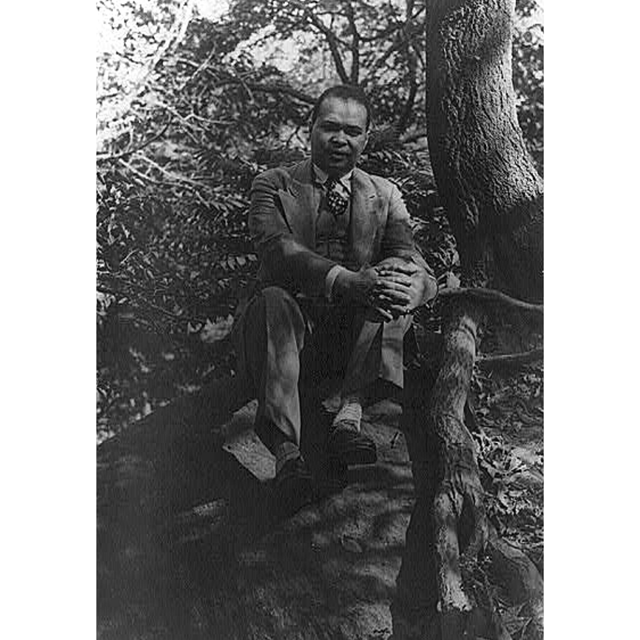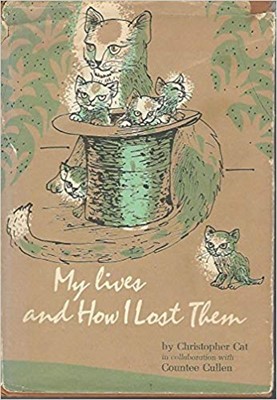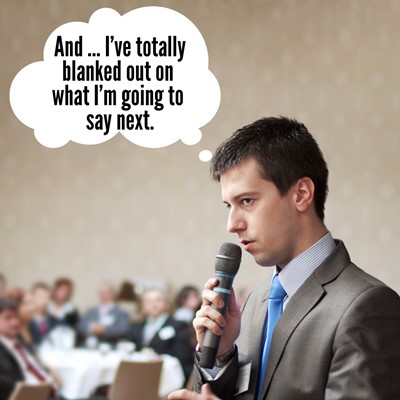
The Buckley School's founder believed that all public speakers should hone their presentation skills by reading poetry out loud. We keep that worthwhile practice alive by including a poem in our magazine each month for you to read aloud. Above, Countee Cullen photographed in Central Park by Carl Van Vechten in 1941, when Cullen was 38 years old.
"Yet do I marvel at this curious thing: To make a poet black, and bid him sing!"
– From the sonnet "Yet Do I Marvel" by Countee Cullen
Novelist, teacher, playwright and above all else—poet—Countee Cullen was a prominent figure in the Harlem Renaissance of the 1920s and spent the last years of his life writing for Broadway.
Cullen came to New York as a teen, was adopted by prominent Harlem pastor Frederick Asbury Cullen, and showed his promise as a poet from an early age.
He was one of only a few Black students at DeWitt Clinton High School. His literary talents were obvious, even then. He was editor of the school’s literary magazine. In 1920, at the age of 17, his poem "I Have a Rendezvous With Life" won a city-wide contest. It was Cullen's response to the popular World War I poem by Alan Seeger, "I Have a Rendezvous With Death."
In an introduction to Cullen’s collected poems, poet and professor Major Jackson writes this about the poem:
Though not perhaps a poem for the ages—only five years later, when he published his first book, Color, Cullen omitted this early work—"I Have a Rendezvous" marked an auspicious beginning.
In its moment, the poem was a minor hit, published in New York’s (white) daily newspapers, and soon reprinted in magazines and anthologies. One writer, Gaius Glenn Atkins, borrowed Cullen's phrase for the title of his own book, A Rendezvous with Life (1922).
Indeed, Cullen scholar Gerald Early has suggested that Cullen's precocious debut—rather than, say, the publication of Jean Toomer's Cane in 1923—ought to mark the beginning of what we now know as the Harlem Renaissance. This may seem a heavy weight of expectation to rest on a poem that is nothing if not light and cheerful, but it accurately reflects the eagerness with which young black writers were being looked to for signs of uplift and revitalization.
Cullen continued to excel as a student and poet. He graduated Phi Beta Kappa from New York University and earned a master’s degree in French and English from Harvard. His poems won multiple national prizes.
 For children, Cullen wrote a "memoir" in the voice of his cat.
For children, Cullen wrote a "memoir" in the voice of his cat.
But his long-time friend Langston Hughes found fault with Cullen’s poetry—and his desire to transcend race in his writing. Though he did not identify Cullen by name, he referred to him as "one of the most promising of the young Negro poets" in his essay "The Negro Artist and the Racial Mountain," calling Cullen’s desire to be a poet not known by his race a betrayal.
Cullen was only 41 years old when he died. Below, for you to read aloud, the poem that first put a 17-year-old Cullen on the literary map:
I Have a Rendezvous with Life
By COUNTEE CULLEN
I have a rendezvous with Life,
In days I hope will come,
Ere youth has sped, and strength of mind,
Ere voices sweet grow dumb.
I have a rendezvous with Life,
When Spring's first heralds hum.
Sure some would cry it's better far
To crown their days with sleep
Than face the road, the wind and rain,
To heed the calling deep.
Though wet nor blow nor space I fear,
Yet fear I deeply, too,
Lest Death should meet and claim me ere I keep
Life's rendezvous.
For more on Cullen’s complex life and varied work, here's an excellent piece by Major Jackson.
Below, you can hear Cullen's voice as he recites his poem "Heritage."






